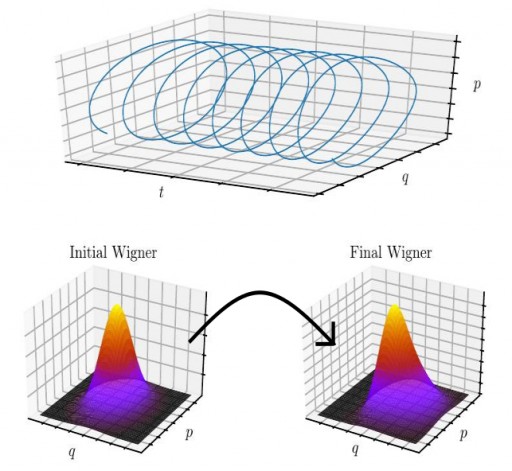Classical trajectory calculations require a quantized phase space distributions from which initial can be sampled. Many quasiclassical formulations, and also the QCPI methodology, are based on the Wigner density. Evaluation of the Wigner phase space density for systems of many degrees of freedom presents an extremely demanding task because of the oscillatory nature of the Fourier-type integral.
We have introduced a simple and efficient, approximate procedure for generating the Wigner distribution, that avoids the computational difficulties associated with the Wigner transform. Starting from a suitable zeroth-order Hamiltonian, for which the Wigner density is available (either analytically or numerically), the phase space distribution is propagated in time via classical trajectories, while the perturbation is gradually switched on. According to the classical adiabatic theorem, each trajectory maintains a constant action if the perturbation is switched on infinitely slowly. We showed that the adiabatic switching procedure produces the exact Wigner density for harmonic oscillator eigenstates, and also for eigenstates of anharmonic Hamiltonians within the WKB approximation. We generalized the approach to finite temperature by introducing a density rescaling factor that depends on the energy of each trajectory. Time-dependent properties are obtained simply by continuing the integration of each trajectory under the full target Hamiltonian. Further, by construction, the generated approximate Wigner distribution is invariant under classical propagation, and thus thermodynamic properties are strictly preserved. Numerical tests on one-dimensional and dissipative systems indicate that the method produces results in very good agreement with those obtained by full quantum mechanical methods over a wide temperature range. The method is simple and efficient, as it requires no input besides the force fields required for classical trajectory integration, and is ideal for use in quasiclassical trajectory calculations.
We have adapted the adiabatic switching Wigner (ASW) method to molecular Hamiltonians in normal mode or Cartesian coordinates. The ASW method is a very simple but sufficiently accurate classical trajectory-based approach, which is based on the classical adiabatic theorem and which is ideally suited to quasiclassical simulations. Each coordinate system poses different challenges, but we have shown that the ASW method produces accurate results in realistic molecular systems such as formaldehyde and butyne over a wide range of temperatures. The ASW method is easy to implement and should find broad application to chemical dynamics.
The molecular applications also highlighted the importance of nuclear quantum effects such as zero-point energy (ZPE) in these systems. Given the simplicity of the ASW method, the quantization of molecular vibrations can now be routinely incorporated in classical molecular dynamics simulations, which are commonly employed in parameterizing force fields. This suggests the re-parameterization of “classical” force fields, to generate new, more accurate force fields, which will be compatible with simulations that will account for nuclear quantum effects in the initial thermal distribution.
Further, we have developed a numerically exact path integral-based method for generating the Wigner distribution (PIW). The Wigner transform involves a multidimensional Fourier-type integral, and the resulting oscillatory integral causes poor convergence known as the Monte Carlo sign problem. Our approach is based on a transformation of the integrand that removes the most problematic highly oscillatory behavior without loss of accuracy.
Related Articles:
